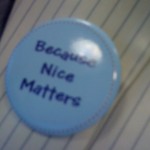June 22, 2015 • Arts Orgs
 I am the opposite of a hoarder. I purge clutter with reckless abandon, assuming most of it is garbage (recyclable garbage, but garbage nonetheless). And most of it is.
I am the opposite of a hoarder. I purge clutter with reckless abandon, assuming most of it is garbage (recyclable garbage, but garbage nonetheless). And most of it is.
But sometimes something sticks with me. I can’t entirely explain why, but I find myself unable to purge certain objects.
One of those objects is a button that reads “Because Nice Matters.” In early 2011, one of my former colleagues at Juilliard was passing these buttons around as a small, subtle reminder that the way we speak to each other matters. The way we interact with others matters. Being nice matters.
That button is from a lifetime ago. I lived in a different state, faced different professional challenges, and struggled with different personal hurdles.
Back then I carried groceries a few blocks home from the store and never bought more than four rolls of toilet paper at a time. (Where would I put more than three spare rolls in my tiny New York apartment?) Now I drive to and from the grocery store transporting canvas bags full of groceries in my trunk instead of on my shoulders.
Back then, I never worried about dinner, secure in the knowledge that delicious food was merely a phone call and a 10-minute wait away, no matter the hour. Now, meal planning takes considerably longer. Our delivery options are woefully limited, and many of them pale in comparison to New York’s options. We order out considerably less often. We grill noticeably more.
Back then I thought about teething issues and I could recite Sandra Boynton. Now we think about losing teeth instead of gaining them and Mary Pope Osborne and J.K. Rowling have superseded Sandra Boynton as favored bedtime authors.
But for all the differences, some things never change. I still struggle to buy in bulk. I still order Thai takeout whenever I can. And being nice still matters.
I found myself thinking about that button as I read Christine Porath’s musings on the subject the New York Times. The list of morale-reducing actions she included is all too familiar:
- “Walking away from a conversation;
- Answering calls in the middle of meetings;
- “Openly mocking people by pointing out their flaws or personality quirks in front of others;
- Reminding their subordinates of their “role” [and “title”] in the organization;
- Taking credit for wins, but pointing the finger at others when problems arise.”
The list – and the author’s research – focuses on poor managers who employ these behaviors, but I’ve witnessed them among all sorts of toxic people. (Are you keeping track of how many times we’ve been talking about toxic people lately? It’s almost like something toxic is in the air.)
No one has “time” to be nice, the author’s research found. At the risk of offering uncertified psychological observations, the most insecure around us tend to be the ones who excel at these offending behaviors. And of course they have no time to be nice. It takes an awful lot of time and energy to pretend to be something you are not, as insecure leaders often do. Such pretenses leave little time for civility.
And civility can be perceived as a weakness: a substitute for competence. “There can be a perceived inverse relationship between warmth and competence,” Porath writes. Insecure leaders avoid weakness with deft skill and mastery (the sort of skill and mastery I’d rather see them employ in service of leadership). But such tradeoffs can be solved. A small change in the pitch of one’s voice and introducing a firm, but kind tone can offset the perceived weakness – particularly for females – without too much trouble. Great managers employ civility without letting their voices raise an octave, and they set boundaries civilly. “Great to see you!” with a squeal of excitement becomes, “Great to see you,” with a steady pitch and a warm style. Civility meets professionalism.
Incivility may indeed “grow out of ignorance, not malice,” as the author points out, but I’d observe that it often grows out of fear as well. In this case, fear grows out of a deep, certain knowledge of weakness and an unwillingness to confront it. An uncivil wall is a fantastic form of protection for the short term, and the long-term consequences (lower sales, decreased employee motivation, retention) are felt at the entity level, rather than by the individual. Other than being a jerk (which in some circles is its own point of pride), there aren’t really any individual consequences to incivility. And yet, our organizations, our institutions, and our businesses suffer.
I hope one day I’ll be able to recycle my button. I hope one day we won’t need the reminder that being nice does indeed matter. But for the time being, I’ll continue to hoard it… And maybe I’ll even sport it around the office.
Civilly of course.


